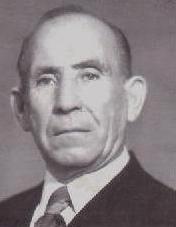Pinkhas Plotkin was born in 1915 in Bobruisk (Belorussia). His family later moved to Liubonichi, where Pinkhas studied in a Yiddish school. After finishing school, he first attended a rabfak (abbr. for "workers' faculty"; it prepared workers to enter institutions of higher education), and later enrolled in the Literature and Linguistics Faculty of the Minsk Pedagogical Institute, from which he graduated in 1939. While a student at the Institute, Pinia became friends with the Yiddish poet Semion Lelchuk, who would be killed in action at the very beginning of the Soviet-German war. The friends published a joint book of poetry in 1940. Later, Plotkin would refer to his friend in his poems. Pinkhas Plotkin's Yiddish poetry was first published in 1934 in the Minsk newspaper Yunger arbeter [The Young Worker], and then in the Minsk journal Shtern [The Star].
Pinkhas Plotkin was drafted into the Red Army in 1939, together with his fellow students. After the beginning of the Soviet-German War on June 22, 1941, Pinkhas, like most of the male population of the Soviet Union, was mobilized for frontline duty. During the war, he fought on the 1st Baltic and the 3rd Belorussian Fronts. Sergeant Plotkin was wounded twice. He was awarded the Order of the Patriotic War, 2nd Class, and some medals.
After the end of the war in May 1945, Pinia Plotkin returned to his native Bobruisk, where he taught Russian language and literature at schools. Back in the summer of 1938, all the Yiddish-language schools in Belorussia had been closed down, with their teachers transferred to either Russian- or Belorussian-language schools. Plotkin combined his teaching career with work as a member of the literary staff of the local newspaper Sovetskaia Rodina. Soon after the launch of the Yiddish journal Sovetish heymland in 1961 in Moscow, Plotkin became a contributor to it. His works also appeared in the newspaper Birobidzhaner shtern, which was published in the Jewish Autonomous Region, in Warsaw's Folkshtime, and in other periodicals. In 1992, Pinia Plotkin left the former USSR for the United States. His works have since been published in various print media in New York, Moscow, and Jerusalem.
From the memoirs of the writer Hirsh Reles about a meeting with Pinia Plotkin
"He sat down and began to read. He read quietly, so that people on the other side of the wall would not overhear us speaking Yiddish. I recall the powerful impression made on me by his poems. They were mainly about the war. In them, one could hear pain, suffering, and boundless hatred for the enemies of our Homeland. He succeeded, like no one else, in conveying feelings with poetic precision, raising his verses to the level of true poetry. His poems resonated with tough ordeals and deep pain. He described the terrible, horrible crimes that the fascists had committed in the territories they occupied. I particularly recall the strong, lingering effect made on me by one short poem, which described the poet's visit to his native town. No Jews remained there. In one of its alleys, he encountered a stranger who told him in amazement: "Wow! A Jew in our little town! You must have come to pay your respects to some of the dead ones, to visit the cemetery."
Afterwards, when we had already had something to drink and eat, I asked him: "What do you intend to do with these poems?"
I asked that for a reason. At the time, all the Yiddish publishing houses had been liquidated. It was even dangerous to speak Yiddish in public.
"I cannot help writing" he replied. "The poems themselves beg to be written down, so how can I refuse them? Anyway, I never actually write for money. It is for the soul."
Translated from Russian, website Mishpoha
An excerpt from Plotkin's poem "In the Liberated Town"
…
We entered the town.
And at the hour of daybreak
It seemed to have died
Forever:
And, for as long as I live,
I will remember this:
Behind barbed wire –
A Jewish ghetto:
And above it -
A star that is burning out."
Translated from Russian, website Mishpoha







